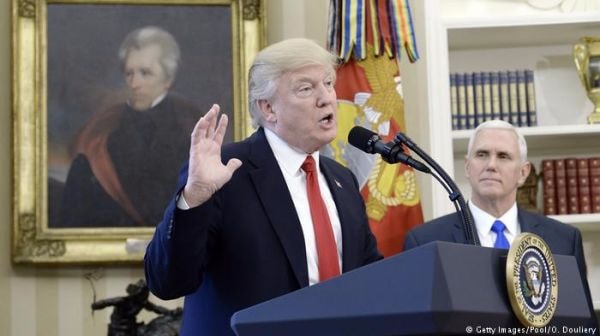The world of undercurrents and events
(Baonghean) - A week full of events occurred when British Prime Minister Theresa May officially signed a 6-page letter activating Article 50 of the Lisbon Treaty, causing the foggy country to leave the 60-year-old alliance in a context of much insecurity.
On the other side of the Atlantic, US President Donald Trump also marked 70 days in power with many hidden waves...
70 days of turmoil
The presidential chair seems not easy for Trump to sit in when recently his White House has continuously struggled with both the Democratic and Republican parties and the media revolving around key topics such as health care and Russia.
The long-term impact is unknown, but the pressure on the billionaire president is clearly increasing. Recently, the White House decided to make a move to remove Deputy Chief of Staff Katie Walsh from the Government and focus on increasing outside support for the President and his agenda.
 |
| President Donald Trump has encountered many problems in his first 70 days in office. Photo: Internet |
Walsh will join the nonprofit America First, which was created earlier this year by Trump campaign staff to drum up support for the president's agenda after the White House received little support for his efforts to repeal and replace the Affordable Care Act.
In a move related to the Republican defeat of the health care law, last week, Trump not only criticized Democrats as many expected, but also targeted the conservative Freedom Caucus group that opposed the Republicans passing Trumpcare.
However, most Freedom Caucus members appear unfazed by the US President's threat to oust them in the next election cycle, publicly stating that instead of attacking them, the administration should push ahead with its legislative agenda and come up with a better bill.
Another blow to the Trump White House in recent days was when Mike Flynn, one of the President's senior advisers and national security advisers, said through his lawyer that he was willing to confront investigators in exchange for immunity from prosecution.
Congressional intelligence committees as well as the FBI are currently investigating possible Russian interference in the US election process as well as Russia's potential ties to the Trump team.
Flynn was forced to resign for failing to fully disclose his contacts with the Kremlin's top diplomat in Washington, as the White House claimed.
Because Flynn was relatively “reclusive” in discussions and key developments in the Trump campaign and at the White House, the lawyer’s assertion that he “certainly has something to say” was widely interpreted as a willingness to share information potentially incriminating to the Trump White House.
Just a quick look at some small incidents is enough to see that the troubles Donald Trump is facing are not simple.
Outside observers also commented that "it is unprecedented for a President to face so many difficulties from the beginning of his first term", or "this is an administration that does not really understand the work of governance",...
There is no clear “way out” of Trump’s current mess, but with his approval rating at an “alarmingly low” level, perhaps the billionaire’s team needs to quickly think of a way to appease and build sympathy with factions that do not like him much, such as the Freedom Caucus, even though that is an impossible task.
Brexit and the security keyword
Brexit - a term that has appeared frequently in the media recently has officially become a reality, amid the whispers of British politicians.
While the decades-long “marriage” is no longer smooth sailing, the foggy country still affirms the importance of Britain building “the closest possible security partnership” with the EU, as evidenced by the phrase “security” mentioned 11 times in Prime Minister Theresa May’s historic speech earlier this week.
In fact, since taking office as Prime Minister, May has placed much of the focus of future trade deals on the defence and security sector.
At the Gulf Cooperation Council meeting in Bahrain late last year, May promised to invest £3 billion in defence spending in the region over the next 10 years, meaning more spending on defence in the Gulf than anywhere else in the world.
In January 2017, as the first world leader to meet US President Donald Trump, she also had the best words for bilateral defense relations, before signing a $125 billion deal to help Türkiye develop a new generation of fighter jets just days later.
Most recently, less than 10 days before activating Article 50, the Financial Times reported that Britain was close to signing a defense treaty with Germany.
 |
| Brexit makes Britain spend more on defense and security. Photo: Internet |
It seems that the global political landscape has changed a lot since last summer, with Britain's security under greater threat than when the country voted to leave the EU.
For instance, the upcoming Brexit negotiations will take place at a time when many EU members feel a formidable threat from Trump, as the new US President repeatedly pressures NATO members to increase their budget contributions.
Many people believe that this is the reason why, at a recent summit in Malta, Europe decided that it needs to rely on itself, not on its “friend” across the Atlantic, to maintain the values of free markets and liberal democracy.
The revelations of a recent study that while the US has only one tank factory, Europe has 19, and that while the US has only one type of fighter jet, Europe has three, seem to further strengthen this determination. Thus, it seems that a new kind of alliance is about to take shape in Europe.
And while it may not be the ideal alliance for some, as experts say, something is better than nothing!
Thu Giang
| RELATED NEWS |
|---|




